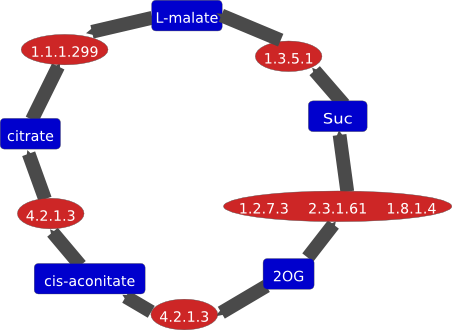EC Number   |
Substrates   |
Organism   |
Products   |
Reversibility   |
|---|
    1.1.1.4 1.1.1.4 | more |
an enantiocomplementary carbonyl reductase, 2,3-butanediol dehydrogenase (BDHA) from Bacillus subtilis is discovered to convert 2-hydroxyacetophenone (2-HAP) to (R)-1-phenyl-1,2-ethanediol ((R)-PED) with excellent stereochemical selectivity. No activity with NADPH |
Bacillus subtilis subsp. subtilis |
? |
- |
- |
    1.1.1.4 1.1.1.4 | more |
enzyme Bdh1p exhibits (2R,3R)-2,3-butanediol dehydrogenase activity, but Bdh1p also exhibit reductive activities towards lignocellulosic aldehyde inhibitors, such as acetaldehyde, glycolaldehyde, and furfural. No activity for glycolaldehyde or hexaldehyde with NADPH. Propionaldehyde is a poor substrate, no activity with glutaraldehyde |
Saccharomyces cerevisiae |
? |
- |
- |
    1.1.1.4 1.1.1.4 | more |
enzyme Bdh1p exhibits (2R,3R)-2,3-butanediol dehydrogenase activity, but Bdh2p also exhibit reductive activities towards lignocellulosic aldehyde inhibitors, such as acetaldehyde, glycolaldehyde, and furfural. No activity for furfural, propionaldehyde, or hexaldehyde with NADPH. Glutaraldehyde is a poor substrate |
Saccharomyces cerevisiae |
? |
- |
- |
    1.1.1.4 1.1.1.4 | more |
enzyme BtBDH is active with meso-2,3-butanediol and (2R,3R)-2,3-butanediol, whereas no activity is observed with (2S,3S)-2,3-butanediol. BtBDH shows similar oxidative activity toward meso-2,3-butanediol and (2R,3R)-2,3-butanediol, and it exhibits a 3fold higher reduction activity toward acetoin compared to diacetyl |
Bacillus thuringiensis serovar kurstaki |
? |
- |
- |
    1.1.1.4 1.1.1.4 | more |
no activity with (2S,3S)-2,3-butane-2,3-diol, but the (2R,3R)-2,3-butanediol dehydrogenase is also active with meso-2,3-butanediol. No activity with 2-butanol, 1,3-butanediol, 1,2-pentanediol, 1,3-propanediol, and glycerol in the oxidation reaction. And no activity with 2,4-pentanedione, butanone, 2,5-hexanedione, n-butanal and 1,3-dihydroxypropanone in the reduction reaction. Substrate specificity, overview. (2R,3R)-2,3-BDH reduces diacetyl into (3R)-acetoin and (2R,3R)-2,3-BD, while racemic acetoin is reduced into (2R,3R)-2,3-BD and meso-2,3-BD |
Pseudomonas aeruginosa |
? |
- |
- |
    1.1.1.4 1.1.1.4 | more |
production of R,R- and meso-2,3-BDO by Paenibacillus brasilensis strain PB24 grown in the modified YEPD medium, pH 6.3, 32°C, up to 72 h |
Paenibacillus brasilensis |
? |
- |
- |
    1.1.1.4 1.1.1.4 | more |
substrate specificity analysis, overview. Enzyme BcBDH catalyzes the selective asymmetric reduction of prochiral 1,2-diketones to the corresponding HK and, in some cases, the reduction of the same to the corresponding 1,2-diols. Aliphatic diketones, like 2,3-pentanedione, 2,3-hexanedione, 5-methyl-2,3-hexanedione, 3,4-hexanedione, and 2,3-heptanedione are well transformed. In addition, surprisingly alkyl phenyl dicarbonyls, like 2-hydroxy-1-phenylpropan-1-one and phenylglyoxal are accepted, whereas their derivatives with two phenyl groups are not substrates. The biocatalytic reduction of 5-methyl-2,3-hexanedione to mainly 5-methyl-3-hydroxy-2-hexanone with only small amounts of 5-methyl-2-hydroxy-3-hexanone within an enzyme membrane reactor is demonstrated. Stereoselectivity and conversion is analyzed by carrying out the reduction reaction of selected diketones and alpha-hydroxyketones |
Alkalihalobacillus clausii |
? |
- |
- |
    1.1.1.4 1.1.1.4 | more |
no activity with (2S,3S)-2,3-butane-2,3-diol, but the (2R,3R)-2,3-butanediol dehydrogenase is also active with meso-2,3-butanediol. No activity with 2-butanol, 1,3-butanediol, 1,2-pentanediol, 1,3-propanediol, and glycerol in the oxidation reaction. And no activity with 2,4-pentanedione, butanone, 2,5-hexanedione, n-butanal and 1,3-dihydroxypropanone in the reduction reaction. Substrate specificity, overview. (2R,3R)-2,3-BDH reduces diacetyl into (3R)-acetoin and (2R,3R)-2,3-BD, while racemic acetoin is reduced into (2R,3R)-2,3-BD and meso-2,3-BD |
Pseudomonas aeruginosa ATCC 15692 |
? |
- |
- |
    1.1.1.4 1.1.1.4 | more |
no activity with (2S,3S)-2,3-butane-2,3-diol, but the (2R,3R)-2,3-butanediol dehydrogenase is also active with meso-2,3-butanediol. No activity with 2-butanol, 1,3-butanediol, 1,2-pentanediol, 1,3-propanediol, and glycerol in the oxidation reaction. And no activity with 2,4-pentanedione, butanone, 2,5-hexanedione, n-butanal and 1,3-dihydroxypropanone in the reduction reaction. Substrate specificity, overview. (2R,3R)-2,3-BDH reduces diacetyl into (3R)-acetoin and (2R,3R)-2,3-BD, while racemic acetoin is reduced into (2R,3R)-2,3-BD and meso-2,3-BD |
Pseudomonas aeruginosa 1C |
? |
- |
- |
    1.1.1.4 1.1.1.4 | more |
no activity with (2S,3S)-2,3-butane-2,3-diol, but the (2R,3R)-2,3-butanediol dehydrogenase is also active with meso-2,3-butanediol. No activity with 2-butanol, 1,3-butanediol, 1,2-pentanediol, 1,3-propanediol, and glycerol in the oxidation reaction. And no activity with 2,4-pentanedione, butanone, 2,5-hexanedione, n-butanal and 1,3-dihydroxypropanone in the reduction reaction. Substrate specificity, overview. (2R,3R)-2,3-BDH reduces diacetyl into (3R)-acetoin and (2R,3R)-2,3-BD, while racemic acetoin is reduced into (2R,3R)-2,3-BD and meso-2,3-BD |
Pseudomonas aeruginosa PRS 101 |
? |
- |
- |





